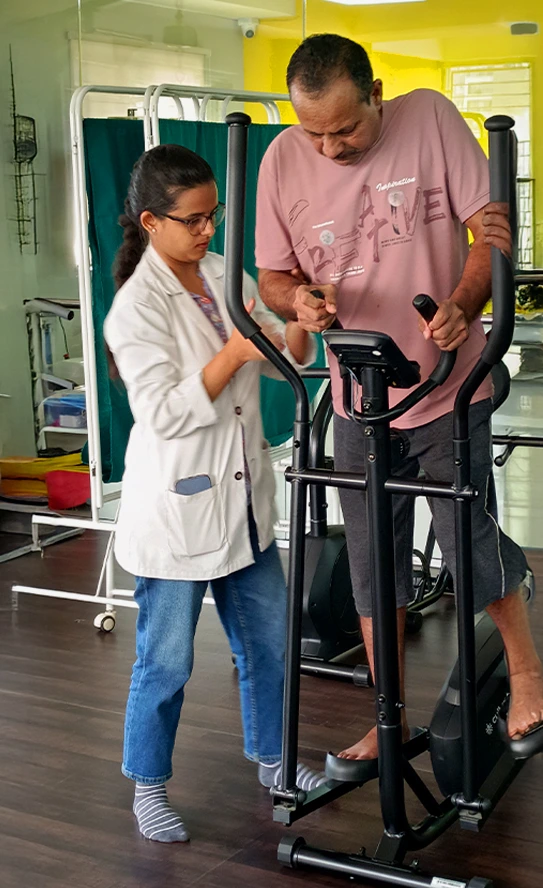Advanced Speech & Swallow Therapy in Pune


The ability to communicate our thoughts and to enjoy a meal with loved ones are two of the most fundamental aspects of our human experience. They are essential to our identity, our relationships, and our daily quality of life. When a neurological event like a stroke or brain injury damages these vital functions, the impact can be devastating and isolating.
At Apricot Care in Pune, we understand these profound challenges. Our Speech & Swallow Therapy program is provided by highly skilled Speech-Language Pathologists (SLPs) who are dedicated to helping you rebuild these essential connections. We provide expert, one-on-one therapy for a wide range of communication and swallowing disorders that often result from neurological conditions.
Using evidence-based techniques and a compassionate, patient-centered approach, we help you find your voice, restore your confidence, and ensure you can eat and drink safely and with pleasure.
What is Speech & Swallow Therapy?
Often called Speech-Language Pathology (SLP), this specialized field of healthcare focuses on much more than just "speech." Our SLPs are experts in the complex processes of communication and swallowing. They diagnose and treat a wide range of disorders related to:
- Language: Understanding what others are saying and finding the right words to express your own thoughts.
- Speech: The physical production of sounds and the clarity of your talking.
- Cognition: The thinking skills that support communication, like memory and problem-solving.
- Voice: The quality, pitch, and loudness of your voice.
- Swallowing (Deglutition): The entire complex process of safely moving food and liquid from your mouth to your stomach.
Our Therapy Program Is Designed To:
- Improve your ability to express your thoughts, needs, and feelings clearly.
- Enhance your ability to understand spoken and written language.
- Restore a safe and efficient swallowing function to prevent choking and pneumonia.
- Strengthen the muscles of your mouth, tongue, and throat.
- Improve cognitive skills that support effective communication.
- Rebuild your confidence and empower you to participate fully in social situations.
Our Areas of Expertise in Communication & Swallowing
Our Speech-Language Pathologists in Pune have specialized expertise in diagnosing and treating the complex
disorders that often follow a neurological event.
Swallowing Disorders (Dysphagia)
This is a primary focus due to its critical importance. It is estimated that a staggering 50-65% of stroke survivors experience some form of dysphagia, which can lead to poor nutrition, dehydration, and a life-threatening condition called aspiration pneumonia (when food or liquid enters the lungs).
- How we help: Our therapists conduct a thorough centeral swallow evaluation to determine where the difficulty lies. Treatment involves specific exercises to strengthen the swallowing muscles (like the Mendelsohn Maneuver or Shaker Exercise), strategies to make swallowing safer, and close collaboration with our [Nutrition Therapy](<-Internal Link) team to recommend appropriate texture-modified foods and thickened liquids.
Language Disorders (Aphasia)
Aphasia is a language disorder that affects your ability to understand or express language, often occurring suddenly after a stroke or brain injury. It does not affect intelligence.
- Expressive Aphasia: You know what you want to say, but you struggle to find the words.
- Receptive Aphasia: You have difficulty understanding what others are saying.
- How we help: We use targeted therapies to help the brain relearn and bypass damaged language pathways. This includes word-retrieval exercises, sentence-building tasks, and training in using alternative communication methods to reduce frustration and restore connection.
Speech Disorders (Dysarthria & Apraxia)
These disorders affect the clarity and production of speech.
- Dysarthria: This is "slurred speech" caused by muscle weakness in the face, tongue, or throat. The message in the brain is fine, but the muscles can't execute it clearly.
- Apraxia of Speech: This is a motor-planning problem. The muscles are strong, but the brain has difficulty coordinating the complex sequence of movements needed for clear speech.
- How we help: For dysarthria, we focus on exercises to strengthen the speech muscles. For apraxia, we use techniques to help the brain retrain motor planning and sequencing, often involving repetitive drills and focusing on rhythm and timing.

Cognitive-Communication Disorders
Following a traumatic brain injury, thinking skills that are crucial for communication are often affected.
- How we help: We use functional, real-world activities to improve memory, attention, organization, and problem-solving skills. The therapy is focused on improving your ability to hold a conversation, follow multi-step directions, and manage your daily life effectively.
Voice Disorders
Conditions like Parkinson's disease can lead to a very soft voice (hypophonia), while other issues can cause hoarseness.
- How we help: We utilize specific techniques like Lee Silverman Voice Treatment (LSVT LOUD®) for Parkinson's patients to improve voice volume and clarity. We also provide exercises to improve vocal cord function and breath support.

our service
Our Comprehensive Care and Support Services
24/7 Nursing and Medical Supervision
At apricot Care, we provide 24/7 nursing support to ensure that you receive continuous care and medical monitoring. Whether you're staying in our facility or recovering at home, our trained nurses and medical staff are always available to address your needs, ensuring a safe and secure environment throughout your recovery journey.
Why Choose Apricot Care for Speech & Swallow Therapy in Pune?
An Essential Part of the Apricot Care Team
This is our greatest strength. Our SLP works directly with your physiotherapist (on breath support and posture), your occupational therapist (on self-feeding), and your dietitian (on food textures). This seamless, integrated care is vital for treating complex conditions.
Specialists in Adult Neurological Conditions
Our therapists are not generalists; they have dedicated their expertise to the specific and complex communication and swallowing disorders that result from stroke, brain injury, and other neurological conditions.
One-on-One, Personalized Sessions
Every session is tailored to your unique needs and goals. You receive the focused, individual attention needed to make real progress in a supportive and encouraging environment.
Focus on Functional, Real-World Communication
Our goal is not just to have you name pictures on a card. It is to help you successfully order a coffee, talk to your grandchild on the phone, or share a meal safely with your family.
.webp)
.webp)
 (1).webp)
.webp)
.webp)
.webp)
.webp)
.webp)
.webp)
.webp)
.webp)
.webp)
.webp)
.webp)
.webp)

